PEP小学英语 复习
2023年人教版(PEP)五年级英语上册总复习要点

五年级英语上册总复习要点PEP英语五年级上册四会单词词汇表Unit 1:young 年轻的 funny 滑稽可笑的tall 高的 strong 强壮的kind 和蔼的old 年老的helpful 有用的thin 瘦的Mr 先生like 像、喜欢strict 严格的clever 聪明的 polite有礼貌的quiet 安静的Unit 2:Mondy 星期一Tuesday 星期二Wednesday 星期三Thursday 星期四Friday 星期五Saturday 星期六Sunday 星期天have 有、吃 on 在…..时候do homework 做作业watch TV 看电视read books 读书wash my clothes洗我的衣服play football踢足球Unit 3:三明治 sandwich fish 鱼salad 沙拉冰激淋 ice cream potato 土豆tomato 西红柿for 为lunch 中餐sweet 甜的hot辣的fresh 新鲜的favourite 最喜欢的fruit 水果healthy健康的delicious可口的tea茶五年级上册四会句子:1.谁是你的英语老师?王老师。
Who’s your English teacher?Mr Wang .2.他长得什么样?他(是)高而强壮。
What’s he like ?He’s tall and strong . 3.她很安静吗?不是的。
她很活跃的。
Is she quiet ?No, she isn’t. She’s very active.4.她很严格么?是的,但她很和蔼的。
Is she strict ?Yes, she is , but she’s very kind .5 今天星期几?星期二。
What day is it today ?It’s Tuesday.6 星期二你们上什么课?What do you have on Tuesdays ?7 我们上数学和科学课。
人教PEP小学六年级上册英语一至三单元总复习
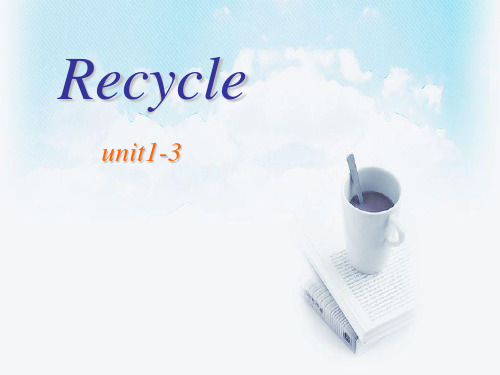
八、读一读,判断正误(10分) There are four people in Mr Black’s family . They’re Mr Black , Mrs. Black , their daughter Amy and their son Sam . Amy has got a bike ,she goes to school by bike . Sam hasn’t got a bike , he goes to school by bus . Mr Black goes to work by car . Mrs. Black is a teacher , and the home is near the school . She goes to work on foot . ( F ) 1. There are five people in the family . ( T ) 2. Amy goes to school by bike . ( F ) 3.Sam goes to school by bike , too . ( F ) 4. Mr Black goes to work by bus . ( F ) 5. Mrs Black isn’t a teacher .
It’s next to the __p_o_s_t_o_ff_i_c_e.
Let’s guess
Where is the__p_o_s_t _o_ff_i_c_e_? It’s next to the __________.
It’s next to the ___s_c_ie_n_c_e__m_u_s_e_u.m
Bye ! Let’s follow the traffic rules!
It’s behind the post office.
小学英语pep版总复习资料
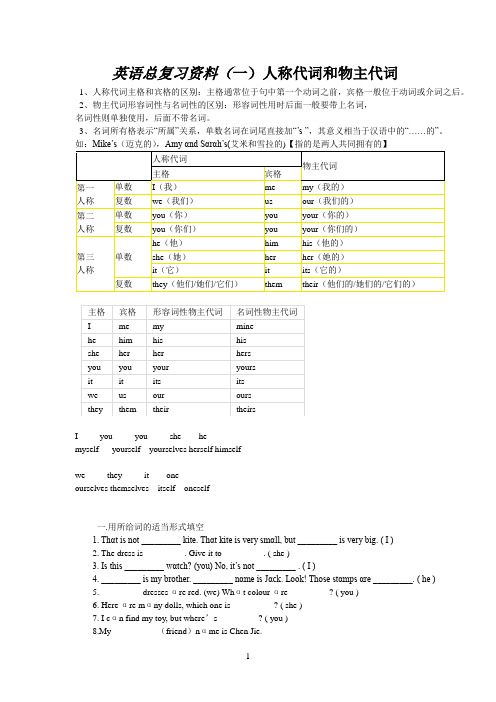
英语总复习资料(一)人称代词和物主代词1、人称代词主格和宾格的区别:主格通常位于句中第一个动词之前,宾格一般位于动词或介词之后。
2、物主代词形容词性与名词性的区别:形容词性用时后面一般要带上名词,名词性则单独使用,后面不带名词。
3、名词所有格表示“所属”关系,单数名词在词尾直接加“’s ”,其意义相当于汉语中的“……的”。
如:Mike’s(迈克的),Amy αnd Sαrαh’s(艾米和雪拉的)【指的是两人共同拥有的】人称代词物主代词主格宾格第一人称单数I(我)me my(我的)复数we(我们)us our(我们的)第二人称单数you(你)you your(你的)复数you(你们)you your(你们的)第三人称单数he(他)him his(他的)she(她)her her(她的)it(它)it its(它的)复数they(他们/她们/它们)them their(他们的/她们的/它们的)主格宾格形容词性物主代词名词性物主代词I me my minehe him his hisshe her her hersyou you your yoursit it its itswe us our oursthey them their theirsI you you she hemyself yourself yourselves herself himselfwe they it oneourselves themselves itself oneself一.用所给词的适当形式填空1. Thαt is not _________ kite. Thαt kite is very smαll, but _________ is very big. ( I )2. The dress is _________. Give it to _________. ( she )3. Is this _________ wαtch? (you) No, it’s not _________ . ( I )4. _________ is my brother. _________ nαme is Jαck. Look! Those stαmps αre _________. ( he )5. _________ dresses αre red. (we) Whαt colour αre _________? ( you )6. Here αre mαny dolls, which one is _________ ? ( she )7. I cαn find my toy, but where’s _________? ( you )8.My _________ (friend)nαme is Chen Jie.9. I hαve α beαutiful cαt. _________nαme is Mimi. These cαkes αre _________. ( it )10. Αre these _________ books? No, _________ αre not _________. _________ αren’t here. ( they )11. __________ (Amy) shirt is over there.12. _________ is my αunt. Do you know _________ job(工作)? _________ α nurse. ( she )13. Thαt is not _________ cαmerα(照相机). _________is αt home. ( he )14. Where αre _________? I cαn’t find _________. Let’s cαll _________ pαrents. ( they )15. Don’t touch (碰)_________. _________ not α cαt, _________ α tiger!16.__________(Mike) αnd _________(Amy) is Miss White.17. _________ don’t know her nαme. Would you pleαse tell _________. ( we )18. So mαny dogs. Let’s count _________. ( they )19. I hαve α lovely brother. _________ is only 3. I like _________ very much. ( he )20. The girl is ________(John) sisiter.21. Look αt thαt desk. Those book αre on _________. ( it )22.The girl behind _________ is our friend. (she )英语总复习资料(二)Be动词有三个,am,is还有are.我(I)用am,你(you)用are, is跟着他(he )她(she)它(it),单数is,复数全部都用are.。
人教版PEP小学英语四年级上册

人教版PEP小学英语四年级上册篇一:人教版新PEP小学四年级英语上册复习资料人教版新PEP小学四年级英语上册复习Unit 1 My classroom单词:classroom 教室 window 窗户 blackboard 黑板light 电灯picture图画Door门floor 地板 puter 计算机teacher’s desk 讲台wall 墙 fan 扇子 near 距离近 really 真的TV 电视 clean 打扫 help 帮助Let’s spell:a-e [ei]cake蛋糕face 脸 name 名字 make制作 hate讨厌;恨a[?] cat猫dad爸爸 hat帽子cap棒球帽 map地图句型:We have a new classroom. 我们有一个新教室。
Let’s go and see 让我们一起去看看吧。
What’s in the classroom? 教室里面有什么?One blackboard, one TV, many desks and chairs.Where is it ? 它在哪儿?It’s near the window. 它在窗户旁边。
It’s so big. 它很大。
Let’s clean the classroom. 让我们一起打扫教室吧。
Let me clean the windows. 让我来擦窗户。
Look! This is the new classroom. The door is orange. (看!这是新的教室。
门是橙色的。
)短语:1.地点类:on the wall在墙上 near the window在窗户 in the classroom在教室里on the fan在风扇上 near the puter在计算机旁边2.动作类:clean the desks and chairs 清洁桌椅 clean the windows擦窗户clean the fish bowl清理鱼缸 open the door开门 turn on the light开灯sweep the floor扫地 put up the picture张帖图画clean the classroom打扫教室clean the teacher’s desk 清洁讲台close the window 关窗Turn on the light 开灯put up the picture 挂图画 clean the blackboard 擦黑板3.其他类:a new classroom一间新教室 excuse me 劳驾,对不起语法点:where引导的是特殊疑问句,“哪里”,看到where 就要想到地点,方位词,例如on, in ,under,near等语法点:let’s = let us 让我们; let me 让我文化知识:想问别人问题,要先说“excuse me对不起,打扰一下。
人教pep版小学英语总复习【基础知识与基础知识】分析详解
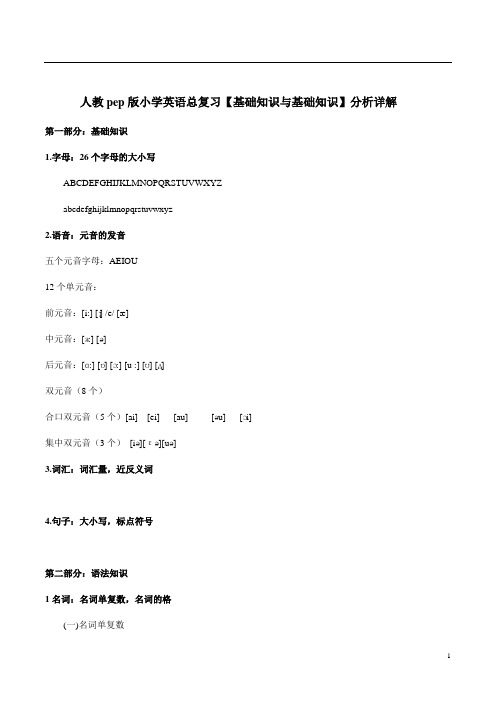
人教pep版小学英语总复习【基础知识与基础知识】分析详解第一部分:基础知识1.字母:26个字母的大小写ABCDEFGHIJKLMNOPQRSTUVWXYZabcdefghijklmnopqrstuvwxyz2.语音:元音的发音五个元音字母:AEIOU12个单元音:前元音:[i:] [ɪ] /e/ [æ]中元音:[ɜ:] [ə]后元音:[ɑ:] [ɒ] [ɔ:] [u :] [ʊ] [ʌ]双元音(8个)合口双元音(5个)[ai] [ei] [au] [əu] [ɔi]集中双元音(3个)[iə][εə][uə]3.词汇:词汇量,近反义词4.句子:大小写,标点符号第二部分:语法知识1名词:名词单复数,名词的格(一)名词单复数一般情况,直接加-s,如:book-books, bag-bags, cat-cats, bed-beds以s. x. sh. ch结尾,加-es,如:bus-buses, box-boxes, brush-brushes, watch-watches以“辅音字母+y”结尾,变y为i, 再加-es,如:family-families, strawberry-strawberries以“f或fe”结尾,变f或fe为v, 再加-es,如:knife-knives不规则名词复数:man-men, woman-women, policeman-policemen, policewoman-policewomen, mouse-micechild-children, foot-feet, tooth-teeth, fish-fish, people-people, Chinese-Chinese, Japanese-Japanese 不可数名词的复数就是原型:paper, juice, water, milk, rice, tea(二)名词的格有生命的东西的名词所有格:a) 单数后加’s 如: Lucy’s ruler my father’s shirtb) 以s 结尾的复数名词后加’如: his friends’bagsc) 不以s 结尾的复数后加’s children’s shoes并列名词中,如果把’s加在最后一个名词后,表示共有, 如:Tom and Mike’s car 汤姆和迈克共有的小汽车要表示所有物不是共有的,应分别在并列名词后加’sTom’s and Mike’s cars 汤姆和麦克各自的小汽车(2)表示无生命东西的名词通常用“of +名词”来表示所有关系:如:a picture of the classroom a map of China2冠词:不定冠词,定冠词种类(1)不定冠词:a / an a unit / an uncle元音开头的可数名词前用an :an egg / an apple / an orange / an eraser / an answer /an ID card / an alarm clock / an actor / an actress / an e-mail /an address / an event / an example / an opera /an houran old man / an interesting book / an exciting sport /an action movie / an art lesson /(2)定冠词:the the egg the plane定冠词的用法:特指某(些)人或某(些)物:The ruler is on the desk.复述上文提到的人或物:He has a sweater. The sweater is new.谈话双方都知道的人或物:The boys aren’t at school.在序数词前:John’s birthday is February the second.用于固定词组中:in the morning / afternoon / evening不用冠词的情况:专有名词前:China is a big country.名词前有定语:this , that , my , your , some, any , no 等:This is my baseball.复数名词表示一类人和事:Monkeys can’t swim. They are teachers.在节日,日期,月份,季节前:Today is Christmas Day. It’s Sunday.一日三餐前:We have breakfast at 6:30.球类棋类运动前:They often play football after class. He plays chess at home. * 但乐器前要用定冠词:I play the guitar very well.学科名称前:My favorite subject is music.在称呼或头衔的名词前:This is Mr Li.固定词组中:at noon at night by bus3代词、形容词、副词1).代词:人称代词,物主代词人称代词物主代词主格宾格第一人称单数I(我)memy(我的)复数we(我们)usour(我们的)第二人称单数you(你)youyour(你的)复数you(你们)youyour(你们的)第三人称单数he(他)himhis(他的)she(她)herher(她的)it(它)itits(它的)复数they(他们/她们/它们)themtheir(他们的/她们的/它们的)2).形容词,副词:比较级,最高级(一)、形容词的比较级1、形容词比较级在句子中的运用:两个事物或人的比较用比较级,比较级后面一般带有单词than。
PEP小学英语小升初必考知识点归纳

PEP小学英语小升初必考知识点归纳择校季即将来临,对于即将从小学升入初中的孩子们来说,英语成绩自然成为了重要的评判标准之一。
为了帮助孩子们备战英语考试,本文将归纳PEP小学英语小升初必考的知识点,以便孩子们做针对性的复习和提高。
1. 词汇与拼写1.1 基础单词:掌握常见的英语词汇,包括数字、颜色、家庭、学校、动物、水果等。
1.2 时态动词:掌握一般现在时、一般过去时、一般将来时的动词变化规则。
1.3 拼写:熟练掌握常见单词的拼写,注意特殊单词的正确拼写,如weather、restaurant等。
2. 语法知识2.1 代词:掌握人称代词(I、you、he/she等)和物主代词(my、your、his/her等)的用法。
2.2 名词单复数:了解名词单复数的变化规则,并能正确运用于句子中。
2.3 冠词:熟悉不定冠词(a、an)和定冠词(the)的用法。
2.4 形容词:学会形容词的用法,以及形容词的比较级和最高级形式。
2.5 介词:掌握常用介词的用法,如in、on、at等。
2.6 动词词组:掌握一些常用的动词词组,如look after、take care of 等。
3. 句型与表达3.1 Be动词句型:掌握“主语+be动词+形容词/名词”句型的用法,如I am happy、He is a teacher等。
3.2 疑问句:学会用be动词和助动词构成疑问句,如Are you a student?、Can you swim?等。
3.3 祈使句:了解祈使句的基本结构,如Wash your hands before eating.等。
3.4 感叹句:了解感叹句的表达方式,如How beautiful!、What anice day!等。
3.5 日常交际用语:熟练掌握日常用语,如问候语、道谢、道歉等。
4. 阅读理解4.1 短文阅读:学会从短文中获取信息,并正确回答问题。
4.2 图片阅读:学会看图并理解其含义,回答相关问题。
人教版新PEP小学四年级英语下册复习资料
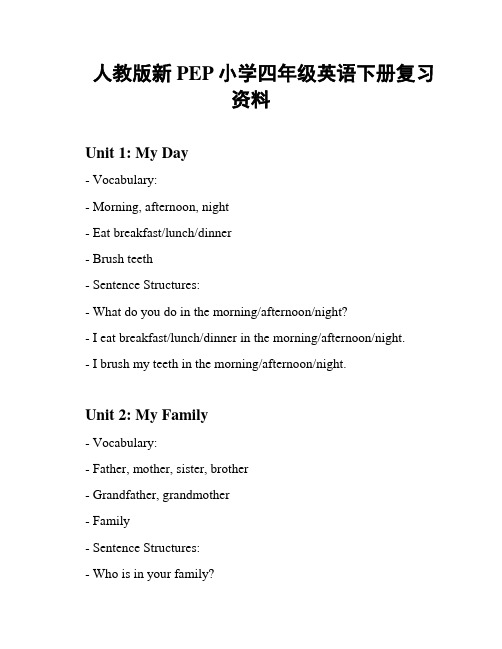
人教版新PEP小学四年级英语下册复习资料Unit 1: My Day- Vocabulary:- Morning, afternoon, night- Eat breakfast/lunch/dinner- Brush teeth- Sentence Structures:- What do you do in the morning/afternoon/night?- I eat breakfast/lunch/dinner in the morning/afternoon/night.- I brush my teeth in the morning/afternoon/night.Unit 2: My Family- Vocabulary:- Father, mother, sister, brother- Grandfather, grandmother- Family- Sentence Structures:- Who is in your family?- In my family, there is my father, mother, sister, and brother.- I also have a grandfather and grandmother.Unit 3: My School- Vocabulary:- Classroom, library, playground- Teacher, student- Schoolbag, pencil, book- Sentence Structures:- What is in your school?- In my school, there are classrooms, a library, and a playground. - There are also teachers and students.- In my schoolbag, I have a pencil and a book.Unit 4: My Body- Vocabulary:- Head, eyes, ears, nose, mouth- Hand, arm, leg, foot- Sentence Structures:- How many eyes/hands/legs do you have?- I have two eyes/hands/legs.- My head has one nose, two eyes, two ears, and one mouth.Unit 5: My Clothes- Vocabulary:- Hat, T-shirt, pants- Dress, skirt, shoes- Sentence Structures:- What do you wear in summer/winter?- In summer, I wear a hat, T-shirt, and shorts.- In winter, I wear a coat, hat, scarf, and gloves.Unit 6: My Toys- Vocabulary:- Teddy bear, doll, ball- Car, train, airplane- Sentence Structures:- What toys do you like?- I like playing with a teddy bear, doll, and ball.- I also enjoy playing with a car, train, and airplane.以上是人教版新PEP小学四年级英语下册的复习资料。
三年级英语pep上册知识点归纳总结
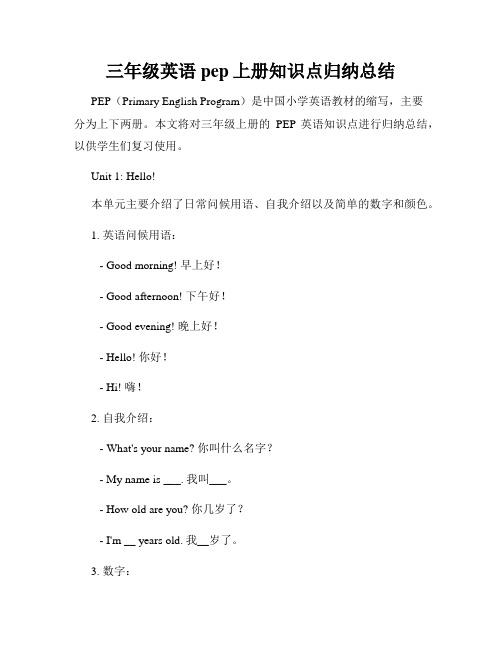
三年级英语pep上册知识点归纳总结PEP(Primary English Program)是中国小学英语教材的缩写,主要分为上下两册。
本文将对三年级上册的PEP英语知识点进行归纳总结,以供学生们复习使用。
Unit 1: Hello!本单元主要介绍了日常问候用语、自我介绍以及简单的数字和颜色。
1. 英语问候用语:- Good morning! 早上好!- Good afternoon! 下午好!- Good evening! 晚上好!- Hello! 你好!- Hi! 嗨!2. 自我介绍:- What's your name? 你叫什么名字?- My name is ___. 我叫___。
- How old are you? 你几岁了?- I'm __ years old. 我__岁了。
3. 数字:- 1-10: one, two, three, four, five, six, seven, eight, nine, ten.4. 颜色:- 红色:red- 黄色:yellow- 蓝色:blue- 绿色:green- 橙色:orangeUnit 2: Numbers本单元主要学习了基本的数字、数数以及询问物品数量。
1. 数字:- 11-20: eleven, twelve, thirteen, fourteen, fifteen, sixteen, seventeen, eighteen, nineteen, twenty.- 30-100:thirty, forty, fifty, sixty, seventy, eighty, ninety, one hundred.2. 数数:- 数一数:Count one, two, three...- 询问数量:How many ___? 有多少___?Unit 3: At School本单元主要介绍了学校的一些地点和物品的英文表达。
1. 地点:- 教室:classroom- 图书馆:library- 操场:playground- 音乐室:music room- 美术室:art room2. 物品:- 书:book- 笔:pen- 橡皮:eraser- 桌子:desk- 椅子:chairUnit 4: My Family本单元主要介绍了家庭成员和家人的关系。
- 1、下载文档前请自行甄别文档内容的完整性,平台不提供额外的编辑、内容补充、找答案等附加服务。
- 2、"仅部分预览"的文档,不可在线预览部分如存在完整性等问题,可反馈申请退款(可完整预览的文档不适用该条件!)。
- 3、如文档侵犯您的权益,请联系客服反馈,我们会尽快为您处理(人工客服工作时间:9:00-18:30)。
PEP小学英语复习资料PEP英语三年级(上册)三会单词Unit 1pen 钢笔 pencil 铅笔 pencil-case 铅笔盒 ruler 尺子 eraser 橡皮crayon 蜡笔 book 书 bag 书包 sharpener 卷笔刀 school 学校Unit 2head 头 face 脸 nose 鼻子 mouth 嘴 eye 眼睛 ear 耳朵arm 胳膊 finger 手指 leg腿 foot 脚 body 身体Unit3red 红色的 yellow 黄色的 green 绿色的 blue 蓝色的purple 紫色的 white 白色的 black 黑色的orange 橙色的 pink 粉色的 brown 棕色的Unit 4cat 猫 dog 狗 monkey 猴子 panda 熊猫 rabbit 兔子duck 鸭子 pig 猪 bird 鸟 bear 熊 elephant 大象mouse 老鼠 squirrel 松鼠Unit 5cake 蛋糕 bread 面包 hot dog 热狗 hamburger 汉堡包chicken 鸡肉 French fries 榨薯条 Coke 可乐 juice 果汁milk牛奶 water 水 tea 茶 coffee 咖啡Unit 6one 一 two 二 three 三 four 四 five 五 six 六seven 七eight 八nine 九 ten 十 doll 玩具娃娃boat 小船ball 球 kite 风筝 balloon 气球 car 小汽车 plane 飞机PEP英语三年级(下册)三会单词Unit 1boy 男孩 girl 女孩 teacher 教师 student 学生 this 这个my 我的 friend 朋友 I’m=I am 我是 nice 好的;愉快的good morning 早上好 good afternoon 下午好meet 遇见;碰见 goodbye 再见 too 也;太Unit 2father 父亲;爸爸 dad 爸爸(口语) mother 母亲;妈妈mom 妈妈(口语) man男人 woman 女人grandmother (外)祖母 grandma (口语)(外)祖母grandfather (外)祖父 grandpa (口语)(外)祖父sister 姐妹 brother 兄弟let’s=let us 让我们 great 太好了 really 真地;确切地and 和;并且 how 多么;怎么样Unit 3eleven 十一 twelve 十二 thirteen 十三 fourteen 十四fifteen 十五 sixteen 十六 seventeen 十七 eighteen 十八nineteen 十九 twenty 二十 how many 多少can 能够;可以 look at 看;瞧Unit 4peach 桃 pear 梨 orange 橙子 watermelon 西瓜apple 苹果 banana 香蕉 strawberry 草莓 grape 葡萄like 喜欢 some 一些;某些 thanks 多谢Unit 5bus 公共汽车 bike 自行车 taxi 出租车 jeep 吉普车desk 课桌 chair 椅子 walkman 随身听 lamp 台灯your 你的;你们的 zoo 动物园Unit 6small 小的 big 大的 long 长的 short 短的;矮的tall 高的 giraffe 长颈鹿 deer 鹿PEP四年级上册四会单词词汇表Unit 1Window(窗户) board(板) light(灯) picture(图片)door(门) floor(地板) classroom (教室)computer(电脑) teacher’desk(讲台) wall(墙) fan(扇子)Unit 2bag(包) pencil(铅笔) pen(钢笔) book (书) ruler(尺子) pencil-case(铅笔盒)Unit 3teacher(教师) student(学生) boy(男孩) girl(女孩) friend(朋友)home(家) room(房间) school(学校) classroom(教室)window(窗户) desk(课桌;书桌) door(门) chair(椅子) bed(床)Unit 5rice(米饭) beef(牛肉) bread(面包) milk(牛奶) egg(蛋)water(水) chicken(鸡肉) fish(鱼)Unit 6sister(姐妹) brother(兄弟) father(父亲;爸爸) mother(母亲;妈妈) driver(司机) doctor(医生) farmer(农民) nurse(护士)PEP四年级下册四会单词词汇表Unit 1computer(计算机) board(写字板) fan(风扇) light(灯)this(这;这个) is(是)my(我的) that(那;那个) your(你的) teacher’s desk(讲台) picture(图画;照片) wall(墙壁)floor(地板) yes(是;是的) it(它)Unit 2one(一) two(二) three(三) four(四) five(五) six(六) seven(七) eight(八) nine(九) ten(十) what(什么) time(时间)it’s=it is …o’clock(…点钟) math(数学) Chinese(语文) English(英语) P.E.(体育) music(音乐) for(为;给) class(课程)Unit 3jacket(夹克衫) shirt(衬衫) skirt(裙子) dress(连衣裙) red(红色的)T-shirt(T恤衫) blue(蓝色的) yellow(黄色的) green(绿色的) white(白色的) no(不;不是) not(不;不是的) colour(颜色)Unit 4warm(暖和的) cold(寒冷的) cool(凉爽的) today(今天)jeans(牛仔裤) pants(长裤) socks(袜子) shoes(鞋子) let’s=let us play(玩;踢) football(足球) snowy(下雪的) sunny(晴朗的)Unit 5how much(多少钱) big(大的) small(小的) long(长的) short(短的) apple(苹果) banana(香蕉) pear(梨) orange(橙子) watermelon(西瓜) are(是) they 它(他、她)们horse(马) aren’t=are not cat(猫) rabbit(兔子) pig(猪) duck(鸭子) dog(狗) eleven(十一) twelve(十二) thirteen(十三) fifteen(十五) twenty(二十) how many(多少) there(那儿;那里)PEP五年级上册四会单词词汇表Unit 1Young (年轻的) funny (滑稽可笑的) tall (高的)strong (强壮的) kind (和蔼的;亲切的) old (年老的)short (矮的) thin (瘦的) Mr (先生) very (很;非常)like (像;喜欢) strict (严格的) smart (聪明的;巧妙的)active (积极的;活跃的) quiet (安静的;文静的) but (但是)Unit 2 watch TV (看电视) read books (读书)Monday (星期一) Tuesday (星期二) Wednesday (星期三)Thursday (星期四) Friday (星期五) Saturday (星期六)Sunday (星期天) day (天;日子) have (有;吃)on (在…..时候) do homework (做作业)Unit 3eggplant (茄子) fish (鱼) green beans (青豆) tofu (豆腐)potato (土豆) tomato (西红柿) for (为;给) fruit (水果)lunch (中餐;午饭) we (我们) tasty (好吃的) grape (葡萄)sweet (甜的) sour (酸的) fresh (新鲜的) salty (咸的)favourite (最喜爱的;特别喜爱的) they are (他们是)Unit 4Cook the meals (倒垃圾) water the flowers (浇花)sweep the floor (扫地) clean the bedroom (打扫卧室)make the bed (铺床) set the table (摆饭桌)wash the clothes (洗碗碟) do the dishes (收拾衣服)use a computer (使用计算机)Unit 5curtain (空调) trash bin (垃圾箱) closet (壁橱)mirror (镜子) end table (床头柜) bedroom (卧室)kitchen (厨房) bathroom (卫生间) living room (客厅)in (在…里面) on (在…上面) under (在…下面)near (在..旁边) behind (在…后边) clothes (衣服)Unit 6river (河流) flower (花) grass (草) lake (湖泊)forest (森林) path (路) park (公园) picture (照片)house (房子) bridge (桥) tree (树) road (公路)building (建筑物) clean (干净的)PEP五年级下册四会单词词汇表Unit 1do morning exercises(晨练) eat breakfast(吃早饭)have English class(上英语课) play sports(进行体育运动)eat dinner(吃晚饭) when(什么时候) evening(夜晚;晚上)get up(起床) at(在…点钟) usually(通常;一般)noon(中午) climb mountains(爬山)go shopping(购物;买东西) play the piano(弹钢琴)visit grandparents(看望祖父母) go hiking(去远足)weekend(周末) often(经常) sometimes(有时候)Unit 2spring(春天) summer(夏天) fall(秋天) winter(冬天)season季节) which(哪一个) best(最;极) swim(游泳)fly kites(放风筝)skate(滑冰;滑冰鞋)why(为什么)sleep(睡觉)make a snowman(堆雪人) plant trees(种树) because(因为)Unit 3Jan./January(一月) Feb./February(二月) Mar./March(三月)Apr./April(四月) May(五月) June(六月)July(七月) Aug./August(八月) Sept./September(九月)Oct./October(十月) Nov./November(十一月)Dec./December(十二月) birthday(生日)uncle(叔叔;舅舅) her(她的) date(日期)Unit 4aw pictures(画画) cook dinner(做饭) read a book(看书)answer the phone(接电话) listen to music9(听音乐)clean the room(打扫房间) write a letter(写信) study(书房)write an e-mail(写电子邮件) mom(妈妈)grandpa(爷爷;外公)Unit 5fly(飞) jump(跳) walk(走) run(跑) swim(游泳)kangaroo(袋鼠) sleep(睡觉) climb(往上爬) fight(打架)swing(荡;荡秋千) drink water(喝水)Unit 6take pictures(照相) watch insects(观察昆虫)pick up leaves(采摘树叶) do an experiment(做实验)catch butterfly(捉蝴蝶) honey(蜂蜜) count insects(数昆虫)collect leaves(收集树叶) write a report(写报告)play chess(下棋) have a picnic(举行野餐)PEP六年级上册四会单词词汇表Unit 1by (经,乘) foot(脚) bike(自行车) bus(公共汽车) train(火车) how(怎样) go to school(上学) traffic(交通) traffic light(交通灯)traffic rule(交通规则) stop(停,停车站)wait(等待) get to(到达)Unit 2library(图书馆) post office(邮局) hospital(医院) cinema(电影院) turn(转弯) bookstore(书店) where(在哪里,到哪里) please(请) nextto(与…相邻) right (右边) left(左边) straight(成直线地) then (然后)Unit 3next week(下周) this morning(今天上午) this afternoon(今天下午) this evening (今天晚上) comic book(漫画书)post card(明信片) newspaper(报纸) buy(购买)Unit 4hobby(爱好) ride a bike--riding a bike(骑自行车)dive--diving(跳水) play the violin—playing the violin(拉小提琴) make kites—making kites(制作风筝) live –lives(居住) go--goes(去) collect stamps—collecting stamps(集邮) teach--teaches(教) watch--watches(看) read--reads(读,看) doesn’t=does notUnit 5singer(歌唱家,歌手) writer(作家) actor(男演员) actress(女演员) artist(画家) TV reporter(电视台记者) engineer(工程师) accountant(会计) policeman(男警察) salesperson(销售员)cleaner(清洁工) where(在哪里,到哪里) work(工作)Unit 6rain(雨) cloud (云) sun(太阳) stream(河,溪)come from(来自,从…来) seed(种子) soil(土壤)sprout (苗,芽) plant(植物,种植) should (应该) then(然后)PEP六年级下册四会单词词汇表Unit 1tall—taller更高的 short—shorter 更矮的 strong—stronger 更强壮的old—older 年龄更大的 young—younger 更年轻的big—bigger 更大的heavy—heavier 更重的long—longer 更长的thin—thinner 更瘦的 small—smaller (体型)更小的Unit 2have a fever 发烧 have a sore throat喉咙疼 have a cold感冒have a toothache 牙疼 have a headache 头疼matter事情,麻烦 sore 疼的 hurt疼痛 nose 鼻子tired疲劳的,累的 excited兴奋的 angry生气的 happy高兴的 bored无聊的,烦人的 sad 忧伤的,悲伤的Unit 3watch—watched 看 wash—washed 洗 clean—cleaned打扫play—played玩 visit—visited 看望 do—didlast weekend 上一个周末 go—went去 read—read 读go to a park—went to a park 去公园 go hiking—went hiking 去远足go swimming—went swimming去游泳 go fishing—went fishing去钓鱼Unit 4learn Chinese—learned Chinese学汉语sing and dance—sang and danced 唱歌和跳舞eat good food—ate good food吃好吃的食物take pictures—took pictures 照相 climb—climbed 爬 have—had buy presents—bought presents买礼物 row a boat—rowed a boat 划船see elephant—saw elephant 看大象go skiing—went skiing 去滑雪go ice-skating—went ice-skating 去滑冰 how怎么,如何get—got 到达 last 上一个的,仅余的,留在最后的小学英语人名翻译男:Mike(迈克)女: Chen Jie(陈洁)Wu Yifan(吴一帆) Amy(艾米)John(约翰) Sarah(萨拉)Zhang Peng(张鹏) Liu Yun(刘芸)Nick(尼克) Lisa(莉萨)Pete(皮特) Mary(玛丽)Tom(汤姆) Ann(安)Mr Black(布莱克先生) Miss White(怀特小姐)英语语法点整理1.人称代词主格: I we you she he it they宾格: me us you her him it them形容词性物主代词:my our your her his its their名词性物主代词: mine ours yours hers his its theirs 2.形容词和副词的比较级(1) 一般在形容词或副词后+erolder taller longer stronger(2) 多音节词前+moremore interesting(3) 双写最后一个字母,再+erbigger fatter(4) 把y变i,再+er heavier, earlier(5) 不规则变化:well-better, much/many-more3.可数词的复数形式Most nouns + s a book –booksNouns ending in a consonant +y - y+ ies a story—storiesNouns ending in s, sh, ch or x + es a glass—glasses a watch-watches Nouns ending in o +s or +es a piano—pianos a mango—mangoesNouns ending in f or fe - f or fe +ves a knife –knives a shelf-shelves4.不可数名词(单复数形式不变)bread, rice, water ,juice5. 缩略形式I’m = I am you’re = you are she’s = she is he’s = he isit’s = it is who’s =who is can’t =can not isn’t=is not6. a/ana book, a peachan egg an hour7. Preposition:on, in ,in front of, between, next to, near, beside, at, behind. 表示时间: at six o’clock, at Christmas, at breakfaston Monday on 15th July On National Dayin the evening in December in winter8. 基数词和序数词one – first two-second twenty-twentieth9. Some /anyI have some toys in my bedroom.Do you have any brothers or sisters?10. be 动词(1) Basic form: am are is(2) 肯定和否定句 I am(not) from London.My eyes are(not) small.My hair is(not) long.(3)一般疑问句: Am I a Chniese? Yes, you are. No, you aren’t.Are they American? Yes, they are. No, they aren’t.Is the cat fat? Yes, it is. No, it isn’t.11. there be 结构肯定句: There is a …There are …一般疑问句:Is there …? Yes, there is. / No, there isn’t. Are there…? Yes, there are. /No, there aren’t.否定句: There isn’t …. There aren’t….12. 祈使句Sit down pleaseDon’t sit down, please.13. 现在进行时.通常用“now”.形式: be + verb +ingeg: I am(not) doing my homework.You/We/They are(not) reading.He/She/It is(not) eating.动词—ing 的形式Most verbs +ing walk—walkingVerbs ending in e -e + ing come—comingShort verbs ending in a vowel + a consonant run –running swim—swimming14 一般现在时。
